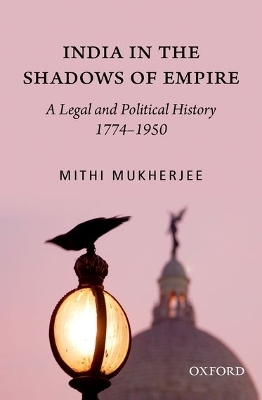
India in the Shadows of Empire
A Legal and Political History (1774-1950)
Seiten
2009
OUP India (Verlag)
978-0-19-806250-9 (ISBN)
OUP India (Verlag)
978-0-19-806250-9 (ISBN)
- Titel ist leider vergriffen;
keine Neuauflage - Artikel merken
This book explores the concepts of justice as equity and of the imperial monarch as the arbiter of justice and their implications for the colonial state, anti-colonial politics, and the construction of the postcolonial Indian polity.
This book is an exploration into the historical process through which justice as equity, rather than freedom, not only provided an ideological framework for the British Empire in India, but also became the ground for anti-colonial representational politics under the Indian National Congress. Ultimately justice as equity became incorporated as the sovereign category in the Constitution of independent India. The book focuses on a largely neglected area of research in modern Indian history-the role of judicial institutions and juridical categories in the formation of both the British Empire and of the movement against colonial rule. It studies the British engagement in India for over two centuries through an analysis of two competing yet collaborative discourses, that of the 'colonial' and the 'imperial' and the forces that they were driven by. The author contends that the discourse of justice as equity helped launch the Congress politics of anti-colonialism, but also emerged as its ultimate limit, in that it was unable to envision complete national independence outside the empire or to articulate a discourse of freedom.
The Gandhian demand for complete independence and mode of resistance through mass movements represented a political breakthrough. However, after independence the Congress, perceiving that the legacy of democratic mass movements could challenge and even threaten the dominance of the imperial legacy embodied in itself, immediately restored its original discourse of imperial justice. It is in the light of this imperial legacy, the author argues that one can understand why the discourse of justice as equity has determined the political formation in post-independence India.
This book is an exploration into the historical process through which justice as equity, rather than freedom, not only provided an ideological framework for the British Empire in India, but also became the ground for anti-colonial representational politics under the Indian National Congress. Ultimately justice as equity became incorporated as the sovereign category in the Constitution of independent India. The book focuses on a largely neglected area of research in modern Indian history-the role of judicial institutions and juridical categories in the formation of both the British Empire and of the movement against colonial rule. It studies the British engagement in India for over two centuries through an analysis of two competing yet collaborative discourses, that of the 'colonial' and the 'imperial' and the forces that they were driven by. The author contends that the discourse of justice as equity helped launch the Congress politics of anti-colonialism, but also emerged as its ultimate limit, in that it was unable to envision complete national independence outside the empire or to articulate a discourse of freedom.
The Gandhian demand for complete independence and mode of resistance through mass movements represented a political breakthrough. However, after independence the Congress, perceiving that the legacy of democratic mass movements could challenge and even threaten the dominance of the imperial legacy embodied in itself, immediately restored its original discourse of imperial justice. It is in the light of this imperial legacy, the author argues that one can understand why the discourse of justice as equity has determined the political formation in post-independence India.
Mithi Mukherjee is Assistant Professor, University of Colorado at Boulder. She teaches modern South Asian history and the history of law and human rights.
THE COLONIAL AND THE IMPERIAL: INDIA AND BRITAIN IN THE IMPEACHMENT TRIAL OF WARREN HASTINGS;; INTO THE LABYRINTH: THE BIRTH OF JUSTICE AS A DISCOURSE OF GOVERNANCE;; "VAKIL RAJ": THE INDIAN NATIONAL CONGRESS AND THE BIRTH OF THE LAWYER AS POLITICAL REPRESENTATIVE;; FROM IMPERIAL JUSTICE TO TRANSCENDENTAL FREEDOM: THE SAMNYASIN AS LEADER IN THE MOVEMENT FOR NATIONAL INDEPENDENCE;; AN IMPERIAL CONSTITUTION? JUSTICE AS EQUITY AND THE MAKING OF THE INDIAN CONSTITUTION
| Verlagsort | New Delhi |
|---|---|
| Sprache | englisch |
| Gewicht | 430 g |
| Themenwelt | Geisteswissenschaften ► Geschichte ► Regional- / Ländergeschichte |
| Geschichte ► Teilgebiete der Geschichte ► Militärgeschichte | |
| Recht / Steuern ► EU / Internationales Recht | |
| Recht / Steuern ► Rechtsgeschichte | |
| Sozialwissenschaften ► Politik / Verwaltung ► Politische Theorie | |
| Sozialwissenschaften ► Soziologie | |
| ISBN-10 | 0-19-806250-8 / 0198062508 |
| ISBN-13 | 978-0-19-806250-9 / 9780198062509 |
| Zustand | Neuware |
| Haben Sie eine Frage zum Produkt? |
Mehr entdecken
aus dem Bereich
aus dem Bereich
neueste Manipulationstechniken als Waffengattung der NATO
Buch | Softcover (2023)
Westend (Verlag)
CHF 33,55
Deutschlands Schwäche in der Zeitenwende
Buch | Softcover (2023)
C.H.Beck (Verlag)
CHF 25,20


